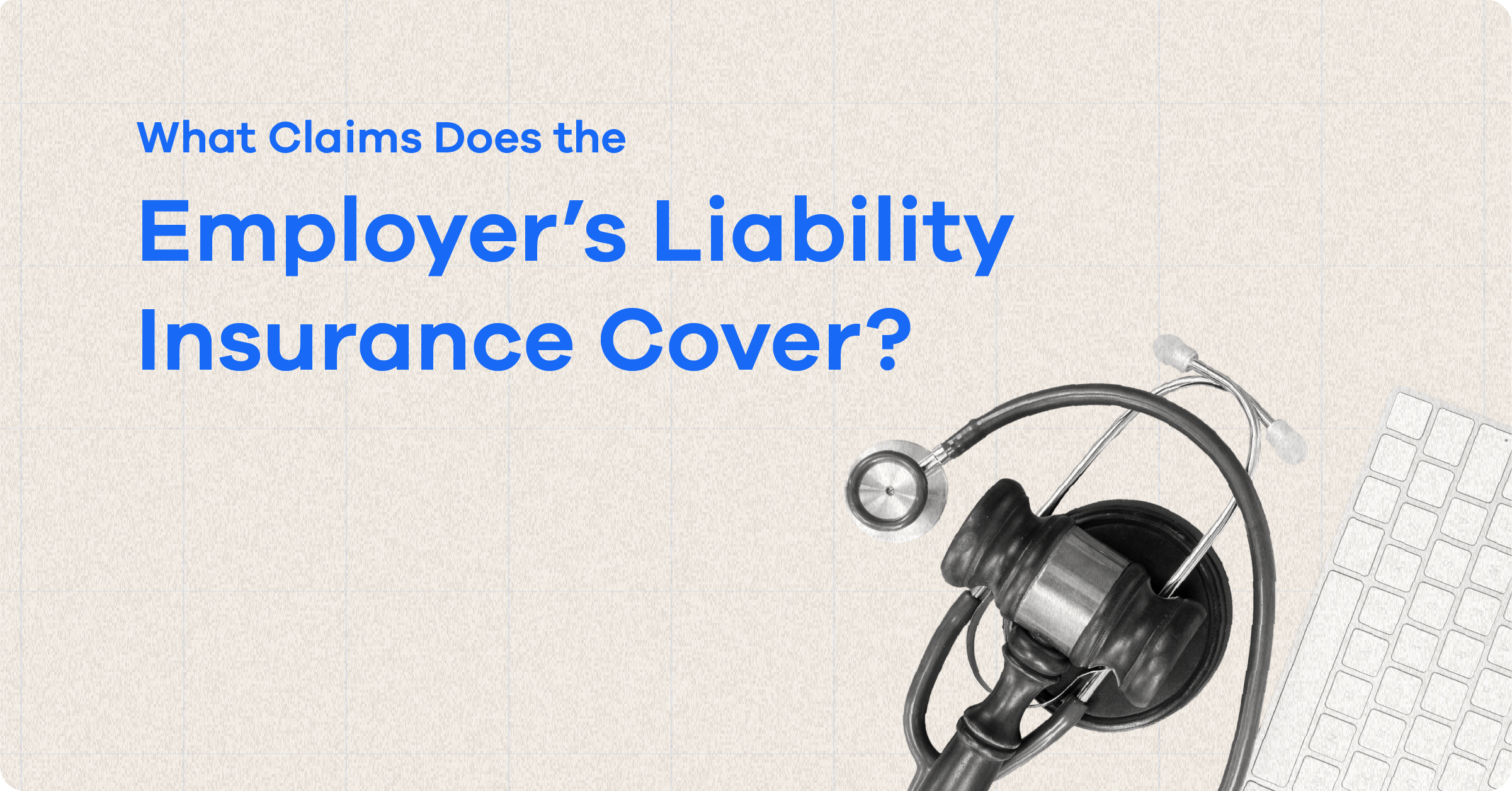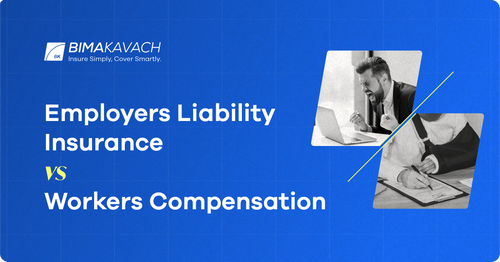As your business grows, so do your liabilities and exposures. You recruit more people, broaden your market, and your revenues rise. All of these successes seem fantastic for your development, but they also come with added risks and obligations. You must consider the most serious risks that your organization confronts, as well as the appropriate measures to address them. You will require different insurance coverage depending on your sector and the nature of the business you run. We acknowledge that selecting suitable coverage for your business appears a daunting task.
But, irrespective of the sector they belong to, employment-related liabilities are common with all businesses that employ people. Employment practices liability, workers' compensation, and employer's liability insurance are the best policies to cover those obligations. You have probably heard about two of them, namely, employer's liability insurance and workers' compensation, used in conjunction, if not interchangeably. So it’s not surprising if you are a bit confused. In this article, we will dissect both these terms, show examples for each, and provide an in-depth review of how they vary.
Let’s start with the basics then!
What is workers' compensation insurance?
Workers' compensation insurance is a type of business insurance coverage that is also known as employee compensation insurance or workmen's compensation insurance. When workplace injuries occur, it provides a safety net for both employers and employees. It gives financial protection to employees who are injured on the job. All businesses in India are required to obtain this insurance.
The Worker Compensation Policy assists employers in financially compensating employees who are wounded or killed as a result of an accident that occurs while they are working. Worker compensation covers employee injuries, impairments, and deaths caused by workplace accidents. For example, suppose one of your employees has injured his hand while working with machinery in the plant. In this scenario, workers' compensation insurance can assist in paying for his treatment, as a form of compensation.
Get Free Quote in Minutes
Conditions Regarding Worker Compensation
The amount of compensation provided by the employer is determined by the worker's age, the nature of his ailment, and his average monthly pay or wages. However, the minimum and maximum compensation rates for death and disability are fixed and subject to regular modifications. In the event of a worker's death, the employer is obligated to compensate the worker's dependents.
The 'Social Security Division' has been established by India's Ministry of Labour and Employment. It is in charge of developing social security policies for workers, ensuring their implementation, and implementing the Workmen Compensation Act in India. However, the act is administered by different state governments in India through Workmen's Compensation Commissioners.
What is the employer's liability for compensation insurance?
Employers liability insurance is a form of commercial insurance that protects employers financially if an employee decides to sue the employer for a work-related accident. In continuation of the example cited in the previous section, if the employee believes that workers' compensation insurance did not cover all the expenses, he may sue the company for poor machinery. Employer’s liability insurance can cover legal costs paid by the employer regardless of whether the employer is liable.
Please keep in mind that the employer’s liability insurance does not cover legal fees incurred as a result of employee claims alleging sexual harassment, discrimination, or wrongful termination. An employer would need to obtain a separate policy called employment practices liability insurance (EPLI) to cover these events.

What Claims does the workers' compensation insurance Cover?
Workers' compensation insurance normally provides three types of protection:
- Medical and lost salary coverage: This portion of your workers' compensation insurance compensates for doctor's visits and treatments, lost income, and other related expenses.
- Employers liability - This coverage can help if an employee files a claim accusing the employer of causing injury or illness to him. It can be used to cover legal fees including damages, settlements, and judgments.
- Death Benefits- Workers' compensation insurance may cover part of the costs if a worker is killed as a result of a work-related injury or illness.
What Claims Does the Workers' Compensation Insurance Not Cover?
You cannot claim workers' compensation insurance in certain situations, mentioned as exclusions in a typical workers' compensation policy in India. These include-
- Minor wounds and cuts that can be remedied by a first aid kit.
- Injuries sustained while not on the job
- Injuries to people who are not your employees
- Injury or sickness caused by unlawful or criminal action
- Employers who purposefully cause harm or disease
- An accident or injury that occurs under the influence of alcohol or drugs
- An accident or injury that occurs under the influence of alcohol or drugs
- All injuries that do not result in partial disability for longer than three days.
- Liabilities of the insured assumed under an agreement
- Employees who are not recognized as workers as per the Workers Compensation Act.
- Diseases listed in Part C of the Workers' Compensation Act of 1923.
What Claims Does the Employer’s Liability Insurance Cover?
There are various forms of workplace injury lawsuits. Employer's liability insurance can protect employers from charges and claims related to the following. It would also cover legal fees, prospective settlements, judgments, or court-ordered damages.
- Consequential bodily injury: Let us assume an employee suffers a catastrophic, life-threatening injury. Also, a member of his immediate family suffers a heart attack as a result of a highly stressful occurrence. The family member has the option of suing the company for monetary damages.
- Negligence: If one of your employees is hurt on the job and claims you failed to safeguard them, they may file a negligence case and sue you for damages.
- Third-party over-action lawsuit: An injured employee may opt to sue another company (such as a machine manufacturer) for an injury suffered at work. The other company may decide to sue you, as it thinks your poor maintenance was the actual reason for the injury. In such a case, it will be classified as a third-party over-action case.
- Dual capacity: If an employee is hurt by an item of machinery manufactured by your company, they may sue you both as the employer and the equipment manufacturer.
- Loss of consortium: This type of lawsuit is typically filed by a family member of an employee. If an employee dies or sustains a serious bodily injury (such as neurological damage) that prevents him from working or fulfilling his everyday duties and functions, his spouse or another family member has the option of suing the employer for negligence.
What Claims Does the Employer’s Liability Insurance Not Cover?
You cannot claim an employer’s liability insurance in certain situations, mentioned as exclusions in a typical employer’s liability policy in India. These include-
- Minor wounds and cuts that can be remedied by a first aid kit.
- Injuries sustained while not on the job
- Injuries to people who are not your employees
- Injury or sickness caused by unlawful or criminal action
- Employers who purposefully cause harm or disease
Employer's Liability Insurance and Workers' Compensation Insurance- How do they differ?
Now that you have got a basic idea about employer's liability insurance and workers' compensation insurance, let’s look into the areas where they differ. Despite having differing coverages, these two plans are complementary in effect. Employer's liability insurance comes in where workers' compensation terminates. Both policies cover job injuries, but only in different ways. Certain important differences between these two policies are listed below-
- Workers' compensation insurance is a legal obligation by the employer to pay compensation in the event of an employee injury.
Employer's liability insurance protects the employer financially by covering compensation and legal expenditures.
- Workers' compensation refers to the benefits that employees receive if they are injured on the job. Employer's liability insurance protects an employer in the event that an employee sues them for workplace injuries.
- Workers' compensation covers statutory requirements covered by India's compensation laws. Employers' liability insurance offers coverage where an employee believes that the workers' compensation policy does not provide appropriate coverage and that the company was negligent.
- Workers' compensation insurance is mandatory for employers but employer's liability insurance is not
- In the case of workers' compensation insurance, the amount payable depends on the prevailing wage system. However, in employer's liability insurance, the amount payable is not limited by the prevailing wages system
- In a workers' compensation claim, the employee is not required to demonstrate that his injury was caused by the employer's negligence. The wounded employee gives up his right to sue his employer for negligence or carelessness, in exchange for medical benefits and pay restoration. But, it is not the case with employer's liability insurance
- Because it caters to a broader range of claims, the employer's liability coverage is broader than workers' compensation coverage. Workers' compensation comes in anytime an injury occurs in the workplace. Whereas, an employer's liability comes in when an employee sues his employer for negligence.
- Workers' compensation insurance pays the costs of the injury without assuming any liability on the part of the employer. On the other hand, the employer liability insurer covers expenditures incurred if the employer is sued for punitive damages. That is, workers' compensation must cover accident-related expenditures, whereas employer liability protects the employer if they are in any way responsible for the occurrence.
The footnote:
Workers' compensation insurance and employer's liability insurance are very similar. Both cover workplace injuries and illnesses, but in different ways. In practice, however, they are quite complementary. It should be emphasized that these policies operate together to shield businesses from the costs associated with employee injuries.

